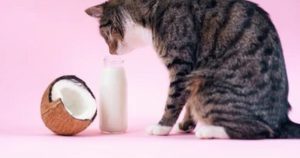Can Cats Have Coconut? Understanding the Health Impacts
When it comes to our feline friends, their diet is a crucial aspect of their overall health and well-being. As cat owners, we often wonder if certain human foods are safe for our pets. One such food is coconut. This tropical fruit has gained popularity for its numerous health benefits for humans, but can cats have coconut? In this comprehensive blog post, we’ll explore this question and provide detailed answers to related queries such as “can cats have coconut oil?”, “can cats have coconut water?” and “can cats have coconut milk?”. We’ll also discuss how much coconut you can safely feed to your cat. Let’s dive into the world of coconuts and cats to understand what’s best for your furry companion.
Can Cats Have Coconut?
Coconut, in its various forms, can be tempting to share with your cat. While coconut meat is not toxic to cats, it should be given in moderation. Coconut contains medium-chain triglycerides (MCTs), which can offer some benefits but may also cause digestive issues if consumed in large quantities. Some cats might enjoy the taste of coconut, while others might not be interested at all.
Health Benefits and Risks of Coconut for Cats
Benefits:
- Healthy Fats: The MCTs in coconut can provide a quick energy source for cats.
- Anti-Inflammatory Properties: Coconut has natural anti-inflammatory properties that can help reduce cat inflammation.
- Skin and Coat Health: Coconut oil can promote a healthy coat and skin, making it shiny and soft.
Risks:
- Digestive Upset: Too much coconut can lead to diarrhea or an upset stomach in cats.
- High Fat Content: Coconut is high in fat, contributing to obesity and other health issues if overfed.
- Allergic Reactions: Some cats may be allergic to coconut, leading to symptoms like itching or gastrointestinal distress.
Can Cats Have Coconut Oil?
Coconut oil is often touted for its health benefits for humans and pets alike. But can cats have coconut oil? The answer is yes but with caution.
Benefits of Coconut Oil for Cats
- Improved Skin and Coat: Applying a small amount of coconut oil to your cat’s skin can help with dryness, itching, and irritation.
- Antibacterial and Antifungal Properties: Coconut oil has natural antibacterial and antifungal properties, which can help prevent infections.
- Boosted Immune System: The lauric acid in coconut oil can support your cat’s immune system, helping them fight off illnesses.
How to Use Coconut Oil for Cats
- Topical Application: You can apply a small amount of coconut oil to your cat’s skin and coat to treat dryness and improve shine.
- Oral Consumption: If your cat enjoys the taste, you can add a tiny amount (about 1/4 teaspoon) to their food. Start with a very small amount to ensure they don’t have any adverse reactions.
Risks of Coconut Oil for Cats
While coconut oil can be beneficial, too much can lead to weight gain and digestive issues. Always consult your veterinarian before adding new supplements to your cat’s diet.
Can Cats Have Coconut Water?
Coconut water is a refreshing and hydrating drink for humans, but can cats have coconut water? Yes, in small amounts.
Benefits of Coconut Water for Cats
- Hydration: Coconut water can help keep your cat hydrated, especially during hot weather.
- Electrolytes: It contains natural electrolytes, which can be beneficial for cats recovering from illness or dehydration.
- Low in Calories: Unlike coconut milk, coconut water is low in calories, making it a safer option for cats.
Risks of Coconut Water for Cats
- Sugar Content: Some coconut water brands contain added sugars, which are not suitable for cats. Always choose pure coconut water without additives.
- Moderation is Key: Natural coconut water should be given sparingly to avoid any digestive upset.
Can Cats Have Coconut Milk?
Coconut milk is creamy and delicious, but can cats have coconut milk? It’s not recommended as a regular part of a cat’s diet.
Why Coconut Milk is Not Ideal for Cats
- High-Fat Content: Coconut milk is high in fat, which can lead to weight gain and pancreatitis in cats.
- Lactose-Free but Fatty: While it’s a lactose-free alternative, the fat content makes it unsuitable for regular consumption.
- Digestive Issues: The richness of coconut milk can cause diarrhea and stomach upset in cats.
If you want to treat your cat occasionally, a tiny amount of coconut milk won’t harm them, but it shouldn’t be a staple in their diet.

How Much Coconut Can I Feed to My Cat?
When it comes to feeding coconut to your cat, moderation is crucial. Here are some guidelines:
- Start Small: Begin with a tiny piece of coconut meat or a small amount of coconut oil to see how your cat reacts.
- Monitor for Reactions: Watch for any signs of digestive upset or allergic reactions, such as vomiting, diarrhea, or itching.
- Consult Your Vet: Always check with your veterinarian before introducing new foods to ensure they are safe for your cat’s health needs.
Conclusion
So, can cats have coconut? Yes, but with caution and in moderation. Coconut in its various forms—meat, oil, water, and milk—can offer some health benefits to cats but also poses risks if overfed. It’s essential to introduce coconut slowly and monitor your cat for any adverse reactions. Remember, a balanced and species-appropriate diet is vital for your cat’s health. Always consult your veterinarian before making any significant changes to your pet’s diet.
FAQs
Is coconut oil safe for cats?
Yes, coconut oil can be safe for cats when used in moderation. It can improve skin and coat health and provide antibacterial benefits. However, too much can cause digestive issues and weight gain.
Can cats drink coconut water?
Cats can drink coconut water in small amounts. It provides hydration and natural electrolytes but should be given sparingly due to its sugar content.
Is coconut milk good for cats?
Coconut milk is not recommended for cats due to its high-fat content, which can lead to weight gain and digestive problems. A tiny amount occasionally is okay, but not as a regular diet.
How much coconut can I feed my cat?
Start with a small piece of coconut meat or a tiny amount of coconut oil. Monitor your cat for any adverse reactions and consult your veterinarian to determine a safe amount.
Are there any risks associated with feeding coconut to cats?
Yes, feeding too much coconut can lead to digestive upset, weight gain, and potential allergic reactions. Always feed coconut in moderation and consult your vet.



